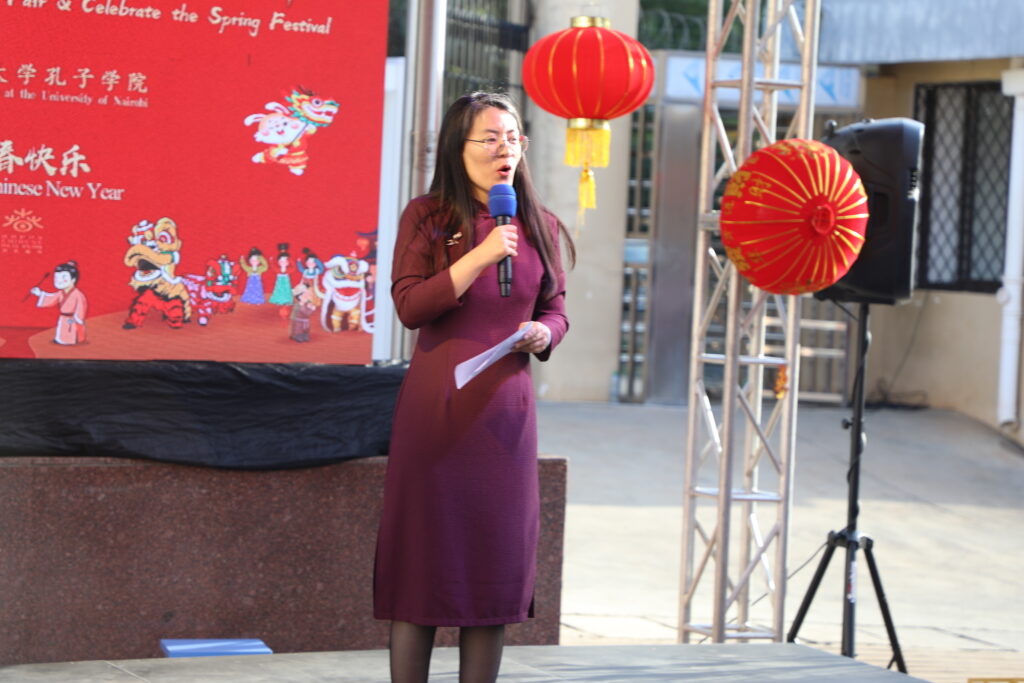Culture is identity.
It entertains, educates, and informs.
If new to you, culture may surprise you.
And this is what Kenyans were recently treated to, during the Chinese Spring Festival held in Nairobi.
The event that was held at the Hub Karen attracted local communities who were curious to understand why China celebrates its new year nearly at the end of January.
Chinese New Year, also known as Chinese Spring Festival, follows the Chinese Lunar calendar and that counting of dates is a little bit different.
I think the Chinese people are so good and interacting with them here has given us an experience of culture exchange as we get to learn new things
Meg Amisi, student
Because of this difference in calendar, Chinese New Year falls on different dates and months. Sometimes they celebrate their new year in the month of February.
“I think the Chinese people are so good and interacting with them here has given us an experience of culture exchange as we get to learn new things,” says Meg Amisi, a student at the Cooperative University of Kenya, pursuing Community Development and Social Work.
She adds: “It’s been fun, playing games and winning presents. Their culture is nice and it is good that they are sharing happiness and this experience with other people.”
Foreign Country
The Festival usually lasts seven days, during which people extend best wishes and greetings to friends, family members and even strangers.
Thereafter, everybody goes back to work and they are believed to be more energetic.
While they celebrated their big day in a foreign country, the organizers made sure that they celebrated it the exact way they would have, in China.
It feels very nice to serve Kenyans the Chinese foods. I have noticed that a lot of Kenyan people like the Chinese hamburger very much
Cao Mei Jun
This was made possible by having outdoor events full of traditional decorations. Red colour which Chinese associate with good luck, hope, happiness and fortune dominated the decorations. There was also a food stand in the fair that included some Chinese foods.
“It feels very nice to serve Kenyans the Chinese foods. I have noticed that a lot of Kenyan people like the Chinese hamburger very much,” says Cao Mei Jun, a Chinese chef at the Hub Karen.
The Spring Festival is the most important traditional festival in China, symbolizing harmony, reunion, peace and happiness.
It also entrusted people’s wishes and hopes for the new year. It is believed that celebrating, the Chinese Lunar New Year together is the best way Chinese strengthen their cultural relationship and inherit the traditional friendship.
“We made a lot of Chinese dishes and desserts. Because of the way Chinese make their sauces for example when you are preparing the barbecue, the meat is the normal Kenyan meat but when making it, its flavour is very nice. Chinese cuisine is very exciting and we need to learn a lot from it,” says David Kariuki, a chef at Kenya Utalii college who prepared Chinese food during the Chinese new year festival event held at Confucius Institute at the University of Nairobi.
Kenya-China Cooperation
Apart from this new year celebration, Kenya and China have through the establishment of inter-school cooperation such as sister schools held a large number of cultural performances, art exhibitions and other people to people exchange programs.
According to data from the Chinese embassy, more than 1,200 Kenyan students have received Chinese scholarships, and more than 2,500 Kenyan students have studied in China.
“We like our culture very much and we carry our cultural heritage because everything has a kind of blessing and happiness wishing one very bright future in the next year. We try to keep our kind of harmony outside and inside through our culture,” says Prof Wang Shangxue, Director of Confucius Institute at University of Nairobi.
She adds; “When we live here we normally cook ourselves but sometimes we also miss our hometown food because China is so big, every place has its local unique food.”

While celebrating the Chinese new year event held at the Confucius Institute at the University of Nairobi, the Vice Chancellor of University of Nairobi, Prof Stephen Kiama appreciated the Chinese government for sponsoring the construction of the buildings.
Prof Kiama who is also the Kenya Director of Confucius Institute, added that the new institution which has been in utilization by both lecturers and students since June last year provides a lot of new possibilities for the students’ development.
“Looking back, in the last year, Confucius Institute achieved a lot, in the whole year, we registered more than 1000 students, which is almost five times that of the year 2021. We organized 35 programs and projects, we reached out to cooperate with different institutions and schools, and we served local communities very well,” he said.
China and Kenya enjoy a bilateral relation and this year marks the 60th anniversary of the establishment of diplomatic relations between the two countries.
Speaking at the same event, Minister Counsellor of the Chinese Embassy in Kenya, Hon. Zhao Xiyuan, said that this is a year of opportunity for further development of China-Kenya relations.
“We hope to take this opportunity to deepen cultural and educational exchanges and cooperation between the two countries. In the future, the Chinese Embassy will continue to support the Confucius Institute at the University of Nairobi and jointly promote the development of Chinese language and Chinese culture in Kenya,” says Mr Xiyuan.
